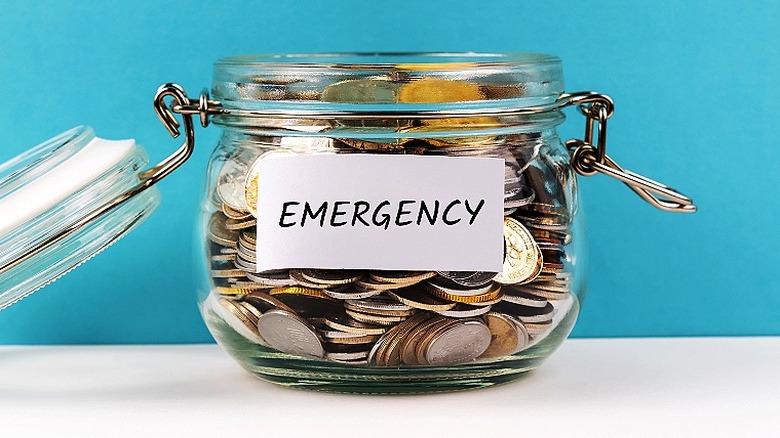What Does It Mean To Be A HENRY?
HENRY isn't just a name these days. In the modern economic world, a HENRY is a person who is significantly strained financially, but looks as though they maybe shouldn't find themselves in that unfortunate position. HENRY stands for "high earners, not yet rich," a concept conceived by Shawn Tully before the housing market crash reset our collective thought process about investments, debt, budgeting, and money as a whole (although he notes that the term for these individuals arose in his work from 2008). The concept predates the cryptocurrency craze, and has remained a core concern for savers and consumers throughout the last 20 years, highlighting just how seriously consumers should take the "status."
In 2019, Tully again revisited the concept of the HENRY in Fortune, highlighting in particular the divergence between the true concept of "rich" and the flashy image that typically comes to mind. Even high earners have to work at developing financial riches, because the measure isn't focused on income levels, but rather accumulated savings assets: your net worth, not your monthly paycheck.
Essentially, lifestyle creep, potentially expansive necessary spending, and little luxuries combined with high taxes on this upper-middle-class category make these consumers certainly comfortable, but constantly concerned about their futures, too. A HENRY is often an educated professional who earns a nice salary — perhaps an attorney, architect, or ophthalmologist — but can't get over the hump of large-scale asset appreciation because of the American tax system and the demands of the modern marketplace.
High earners can start with their emergency savings
No matter how you may find yourself in a high-paying job, once you reach this comfortable resting point in your career, the pitfalls begin to multiply. For one thing, life's lighter side calls out to those with great vigor when newly expanded incomes come into play. A raise provides greater disposable income, which can be translated into something that enriches your life in one way or another. While some might be fleeting gratification purchases, others can radically improve your future but feel far less impactful in the here and now.
A raise that sees you earning an extra $1,000 per month, for example, could dramatically fund your emergency savings fund, retirement accounts, and your child's 529 plan — without altering any other feature in your budget. But it might also go toward additional nights out on the town, clothing, and perhaps even an augmented vacation schedule (if you can get the time off, that is).
This financial choice can either make or break your future. Opting to double down on emergency savings and the like is a hard choice to make, but prioritizing your emergency cash is actually one of the clearest signs that you're above average financially, even if you're actively struggling to balance mortgage payments and child care costs with your retirement contributions. For those firmly within the HENRY category, and others facing similar challenges, emergency savings is a great starting point to make lasting change.
Focusing on 401(k) matches can radically change things, too
For HENRYs, another important place to focus newly added income is in free-money opportunities. These don't come around often, but one of the most potent options lies with your 401(k). Companies across the U.S. offer 401(k) matching programs that double your contributions up to a certain limit. The federal ceiling on these contributions is $69,000 for those under 50 and $76,500 for employees over this age in 2024 (though, you're perhaps unlikely to worry about the upper threshold without a huge payday).
Matched contributions are rocket fuel for your retirement investments. You can't generally access these funds until you've reached retirement, of course, but that's the exact financial arena that people struggling with being a HENRY are concerned with. The more money you're able to push into your retirement accounts, the greater your overall wealth will become, ultimately lifting you out of this status and into the classical definition of "rich."
Each dollar you can set aside for yourself today, with the help of 401(k) matching becomes $2, then multiplies over time. Assuming that general stock market stability remains consistent, investments in modest index funds tend to double every seven years. By adding matching contributions, you cut this cycle in half (in terms of just your principal investment dollars), dramatically shortening the time it takes to reach your financial goals.
However, don't put all your eggs in the retirement basket
Even as a HENRY finds value in staving off lifestyle inflation in order to prioritize their retirement savings, it's important to keep things in perspective as well. No person on this Earth was put here to work, retire, and die. Your working years (the bulk of a person's life) are not just for making money and saving as much as possible. While there are some who have made crucial lifestyle decisions that will allow them to retire far earlier than the average worker, they are also sacrificing some of their younger years to attain this goal.
HENRYs are typically individuals who worry about amassing lasting wealth for themselves, and intelligent choices that help push retirement saving a little farther out in front can help assuage these concerns. But they are also individuals who enjoy a good quality of life. HENRYs find themselves in their situation because they are saving for their children's college education or bought a home in a nice neighborhood. It's crucial to put these tradeoffs into perspective in order to find a solid balance between facilitating a happy life today and a retirement lifestyle that isn't wanting as a result of lackluster planning.



